Module 8 Time off 模块导学案(3课时)
文档属性
| 名称 | Module 8 Time off 模块导学案(3课时) | 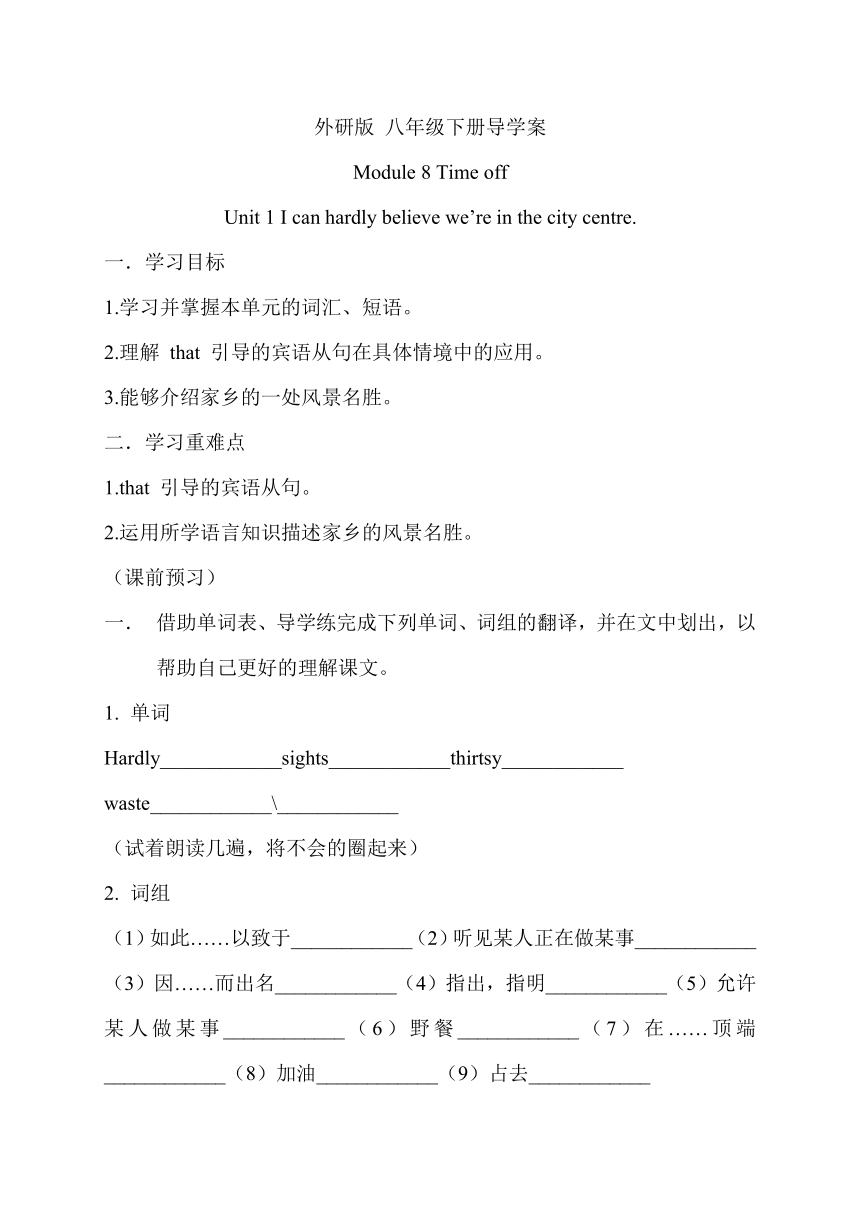 | |
| 格式 | zip | ||
| 文件大小 | 25.0KB | ||
| 资源类型 | 教案 | ||
| 版本资源 | 外研版 | ||
| 科目 | 英语 | ||
| 更新时间 | 2015-04-26 00:05:13 | ||
图片预览

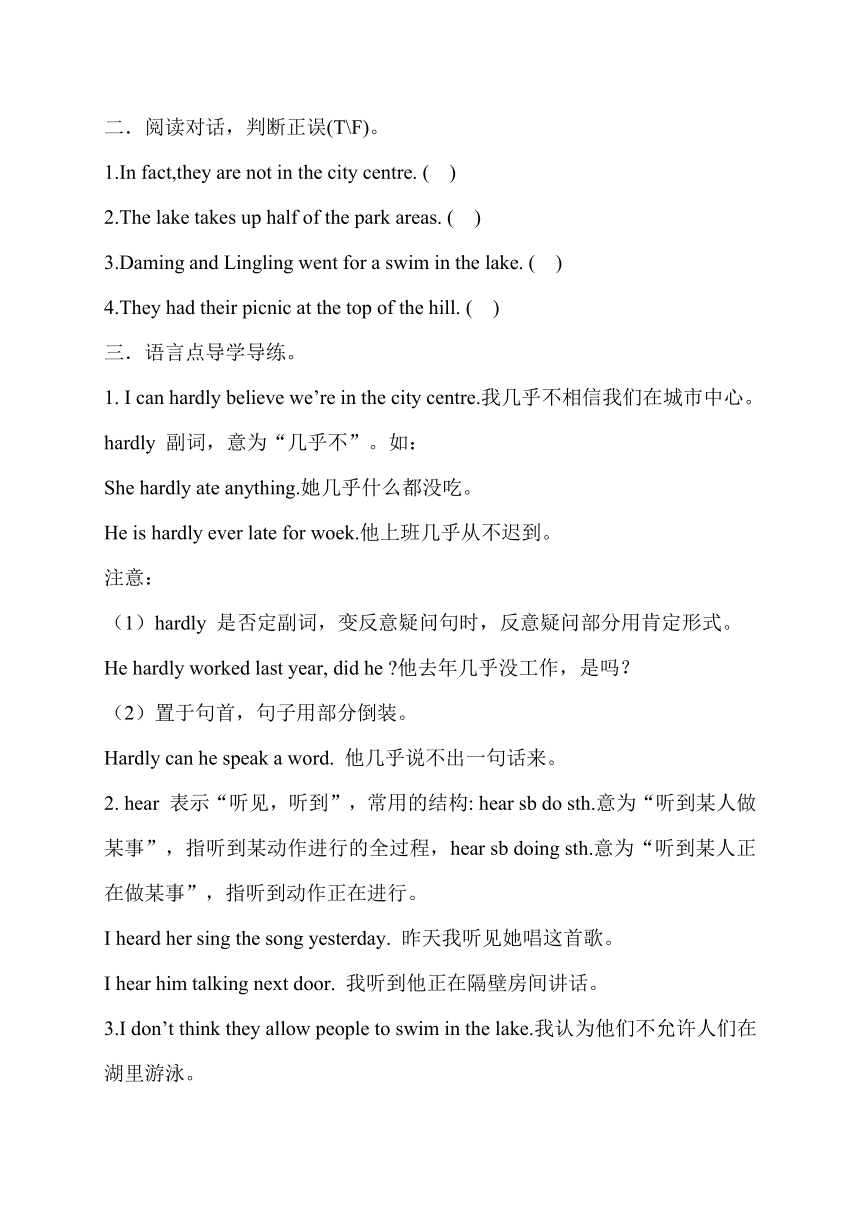
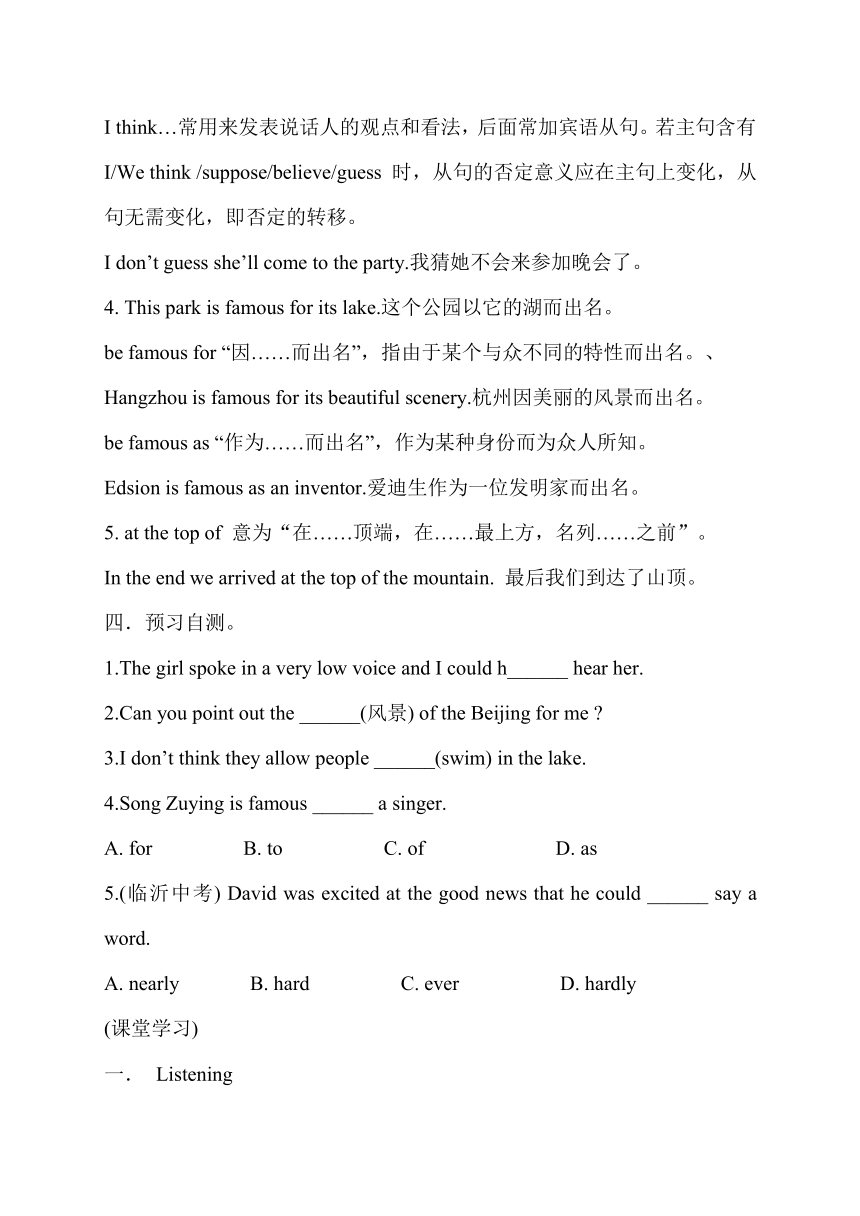
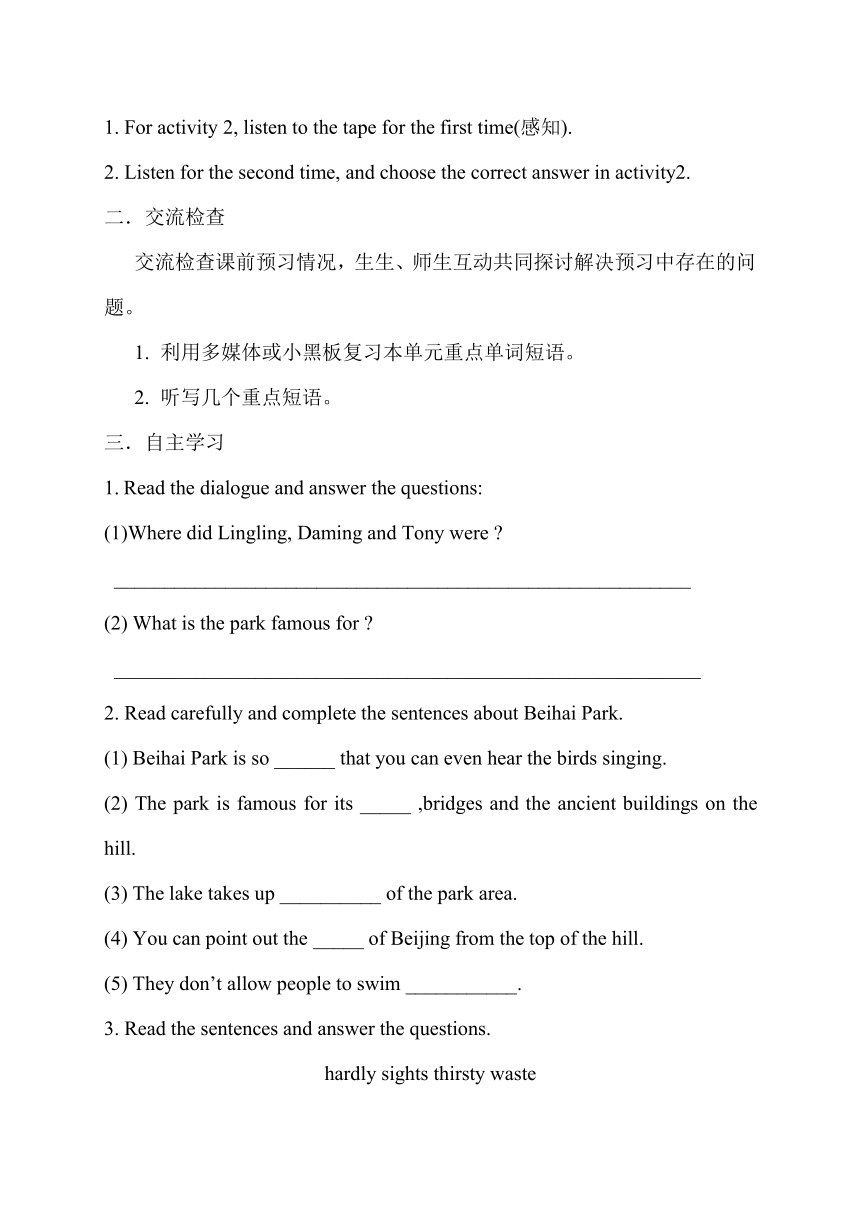
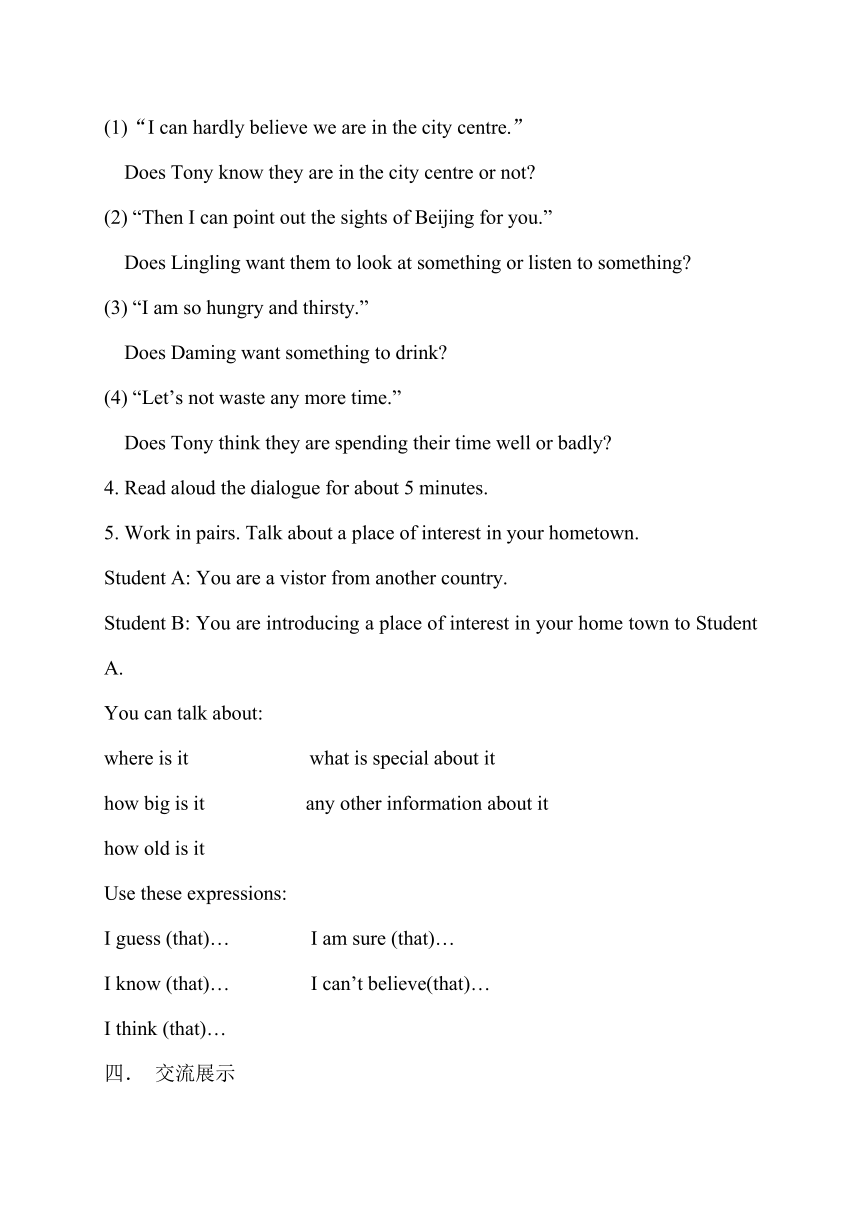
文档简介
外研版 八年级下册导学案
Module 8 Time off
Unit 1 I can hardly believe we’re in the city centre.
一.学习目标
1.学习并掌握本单元的词汇、短语。
2.理解 that 引导的宾语从句在具体情境中的应用。
3.能够介绍家乡的一处风景名胜。
二.学习重难点
1.that 引导的宾语从句。
2.运用所学语言知识描述家乡的风景名胜。
(课前预习)
借助单词表、导学练完成下列单词、词组的翻译,并在文中划出,以帮助自己更好的理解课文。
单词
Hardly____________sights____________thirtsy____________ waste____________\____________
(试着朗读几遍,将不会的圈起来)
词组
(1)如此……以致于____________(2)听见某人正在做某事____________(3)因……而出名____________(4)指出,指明____________(5)允许某人做某事____________(6)野餐____________(7)在……顶端____________(8)加油____________(9)占去____________
二.阅读对话,判断正误(T\F)。
1.In fact,they are not in the city centre. ( )
2.The lake takes up half of the park areas. ( )
3.Daming and Lingling went for a swim in the lake. ( )
4.They had their picnic at the top of the hill. ( )
三.语言点导学导练。
1. I can hardly believe we’re in the city centre.我几乎不相信我们在城市中心。
hardly 副词,意为“几乎不”。如:
She hardly ate anything.她几乎什么都没吃。
He is hardly ever late for woek.他上班几乎从不迟到。
注意:
(1)hardly 是否定副词,变反意疑问句时,反意疑问部分用肯定形式。
He hardly worked last year, did he 他去年几乎没工作,是吗?
(2)置于句首,句子用部分倒装。
Hardly can he speak a word. 他几乎说不出一句话来。
2. hear 表示“听见,听到”,常用的 ( http: / / www.21cnjy.com )结构: hear sb do sth.意为“听到某人做某事”,指听到某动作进行的全过程,hear sb doing sth.意为“听到某人正在做某事”,指听到动作正在进行。
I heard her sing the song yesterday. 昨天我听见她唱这首歌。
I hear him talking next door. 我听到他正在隔壁房间讲话。
3.I don’t thi ( http: / / www.21cnjy.com )nk they allow people to swim in the lake.我认为他们不允许人们在湖里游泳。
I think…常用来发表说话人的观点 ( http: / / www.21cnjy.com )和看法,后面常加宾语从句。若主句含有I/We think /suppose/believe/guess 时,从句的否定意义应在主句上变化,从句无需变化,即否定的转移。
I don’t guess she’ll come to the party.我猜她不会来参加晚会了。
4. This park is famous for its lake.这个公园以它的湖而出名。
be famous for “因……而出名”,指由于某个与众不同的特性而出名。、
Hangzhou is famous for its beautiful scenery.杭州因美丽的风景而出名。
be famous as “作为……而出名”,作为某种身份而为众人所知。
Edsion is famous as an inventor.爱迪生作为一位发明家而出名。
5. at the top of 意为“在……顶端,在……最上方,名列……之前”。
In the end we arrived at the top of the mountain. 最后我们到达了山顶。
四.预习自测。
1.The girl spoke in a very low voice and I could h______ hear her.
2.Can you point out the ______(风景) of the Beijing for me
3.I don’t think they allow people ______(swim) in the lake.
4.Song Zuying is famous ______ a singer.
A. for B. to C. of D. as
5.(临沂中考) David wa ( http: / / www.21cnjy.com )s excited at the good news that he could ______ say a word.
A. nearly B. hard C. ever D. hardly
(课堂学习)
Listening
1. For activity 2, listen to the tape for the first time(感知).
2. Listen for the ( http: / / www.21cnjy.com ) second time, and choose the correct answer in activity2.
二.交流检查
交流检查课前预习情况,生生、师生互动共同探讨解决预习中存在的问题。
利用多媒体或小黑板复习本单元重点单词短语。
听写几个重点短语。
三.自主学习
1. Read the dialogue and answer the questions:
(1)Where did Lingling, Daming and Tony were
_________________________________________________________
(2) What is the park famous for
__________________________________________________________
2. Read carefully and complete the sentences about Beihai Park.
(1) Beihai Park is so ( http: / / www.21cnjy.com )______ that you can even hear the birds singing.
(2) The park ( http: / / www.21cnjy.com )is famous for its _____ ,bridges and the ancient buildings on the hill.
(3) The lake takes up __________ of the park area.
(4) You can point out the _____ of Beijing from the top of the hill.
(5) They don’t allow people to swim ___________.
3. Read the sentences and answer the questions.
hardly sights thirsty waste
(1)“I can hardly believe we are in the city centre.”
Does Tony know they are in the city centre or not
(2) “Then I can point out the sights of Beijing for you.”
Does Lingl ( http: / / www.21cnjy.com )ing want them to look at something or listen to something
(3) “I am so hungry and thirsty.”
Does Daming want something to drink
(4) “Let’s not waste any more time.”
Does Tony think they are spending their time well or badly
4. Read aloud the dialogue for about 5 minutes.
5. Work in pairs. Talk about a place of interest in your hometown.
Student A: You are a vistor from another country.
Student B: You are ( http: / / www.21cnjy.com )introducing a place of interest in your home town to Student A.
You can talk about:
where is it what is special about it
how big is it any other information about it
how old is it
Use these expressions:
I guess (that)… I am sure (that)…
I know (that)… I can’t believe(that)…
I think (that)…
四. 交流展示
组内交流讨论,然后小组代表到讲台表演,看哪个小组表现最好,予以表扬。
五.小试牛刀
1.单项选择
(1)When I was walki ( http: / / www.21cnjy.com )ng in the street, I saw a plane ______ over my head.
A. flies B. flying C. flew D. to fly
(2)Pass me my glasses, Tom. I can ______ see the pictures.
A. hardly B. really C. rather D. almost
(3)The table _______ too much room.
A. takes up B. takes off C. takes away D. takes to
(4) Lu Xun _____ a great writer in China,
A. is famous for ( http: / / www.21cnjy.com ) B. is famous as C. is famous like D. is famous to
2.用方框中所给短语的适当形式填空
I can ______ the sights of Beijing for you.
______! Let’s have a picnic.
Suzhou______ its gardens.
It’s better to have our picnic ______ the hill.
The desk ______ too much room. Can you take it away
(课后反思)
在这一节课,我学到了______________________________________。
Unit 2 We thought somebody was moving about.
一.学习目标
1.会熟练运用本课所学的单词、短语。
2.阅读理解邮件,掌握文章大意,并能捕捉文中的细节。
3.能够运用从句写一篇介绍旅游胜地的短文。
二.学习重难点
1. 能够读懂有关旅行经历的文章并获取集体信息,能理解事件发生的顺序。
2.运用所学语言知识写一篇介绍旅游胜地的短文。
(课前预习)
阅读短文在文中划出下列新词汇,注出词义,并试着朗读几遍,将不会的圈起来。
1.square_________2.kilometre__________3.shape__________
4.human_________ 5.wake________ 6.someody_________ 7.about________ 8.path________ 9.pull_________ 10.freshwater________
二.阅读短文,在文中划出短语朗读并默写。
1.承诺做某事______________ 2.玩得开心_____________
3.看起来像______________ 4.制造噪音______________
5.唤醒某人______________ 6.come out______________
7.look for______________ 8.find out_____________
9.pull…off…______________ 10.from the top______________
三、再阅读短文,判断句子正误。(T/F)
1. Betty had a wonderful time in Zhangjiajie.( )
2. Somebody was moving about, so they heard some noise.( )
3. Dongting lake is the second-largest lake in China.( )
四.语言点导学导练。
1. I promised to write,so…我答应要写信(给你们),所以……
promise to do sth. ( http: / / www.21cnjy.com )意为“答应做某事,承诺做某事”。Promise也可接双宾语,即promise sb. sth=promise sth to sb.如:
My father promised me a computer
=My father promised a computer to me.我爸爸答应给我买一台电脑。
2.It woke everybody up.它把每个人都唤醒了。
wake up意为“醒来”。wake sb up意为“把某人唤醒”,代词须放在wake与up之间。如:
I usually wake up at 6:30.我通常6:30醒来。
His mother often wakes him up at 5:00 in the morning.他妈妈经常早上五点把他叫醒。
3. We thought somebody was moving about.我们认为有人在四处走动。
move about 意为“走来走去,四处走动”。
与move有关的短语有:
move in 搬进来 move out 搬出去 move away 搬走
4.From the top we hoped to see the lakes and forests.从山顶上我们希望看到湖和森林。
hope也常用作及物动词,以为“希望”。主要句式有:
(1)hope to do sth.希望做某事。如:
I hope to travel around the world.我希望周游世界。
(2)hope+that从句 希望……。如:
I hope that you’ll be better soon.我希望你很快好起来。
5. But it was a pity that it was cloudy.但是很遗憾天是多云的。
本句中的that it was cloudy 是that 引导的主语从句,it 是形式主语,真正的主语是气候的that 从句。如:
It was a pity that you missed the concert. 你错过了演唱会,真是太遗憾了。
五.预习自测。
1.根据句意及汉语提示完成单词。
(1) There is a small______(小径) through the forest.
(2) The doctor______(拔) out one of my bad teeth.
(3) It’s famous for the strange______(形状) of its tall rocks.
(4) Some of the rocks look like______(人).
(5) The loud noise______(唤醒) me up this morning.
2.单项选择。
1.The loud noise _________.
A. woke up me B. woke me up C. wake me up
2.Every student hopes _____ a good grade in the exam.
A. to B. of C. for D. with
3.Best ______ to you. Happy Teachers’ Day.
A. wishes B. wish C. hope D. hopes
(课堂学习)
一.交流检查。
1. 交流检查课前预习情况,探讨解决预习中存在的问题,利用大卡片复习本单元的新单词。
2. 听写重点短语。
二.自主学习
1. Fast reading. Read fast and answer the questions.
(1)What is Zhangjiajie like _____________________________________
(2)What did we find ( http: / / www.21cnjy.com ) after we heard a noise ______________________________________________________________
2. Careful reading. Number the sentences in the correct order..
a) Betty pulled a leaf off a plant.
b) The noise woke every body up.
c) They climbed Mount Tianzi.
d) A monkey made some noise.
e) They camped by a small lake.
f) Lingling’s u ( http: / / www.21cnjy.com )ncle said that people should protect everything in Zhangjiajie.
3. Complete the sen ( http: / / www.21cnjy.com )tences with the correct form of the words in the box.
human kilometre path wish shape
Are there rocks in ______ or animal ______ in your hometown
How many______ is Zhangjiajie from your hometown
Is it safer to walk along a______ or climb over rocks
Where do you_______ you were right now
三.交流展示:
1. 讨论解决学习疑难。
2. 教师解释。
四.Writing.
Choose the most imp ( http: / / www.21cnjy.com )ortant or interesting facts about Zhangjiajie and write a passage about it.
Zhangjiaj ( http: / / www.21cnjy.com )ie is zbout 480 square kilometres. It is about 400 kilometres from…
五.巩固训练。
1. 请帮我查清楚他们带走了多少个帐篷。
Please help me ______ ______ how many tents they have taken away.
2. 很遗憾你没有通过这次考试。
______ ______ ______ ______ you didn’t pass the exam.
3. ______, Tom ! It’s time t get up and go to school.
A. Wake up B. Make up C. Grow up D. Look up
4. Speak aloud, please! I can ______ hear you.
A. usually B. almost C. hardly D. nearly
5. The retired coup ( http: / / www.21cnjy.com )le enjoy ______ photos. They always go out with their cameras. A. take B. took C. to take D. taking
(课后反思)
在这一节课,我学到了____________________________________________
Unit 3 Language in use
一.学习目标
1.会用本课所学四会单词、短语。
2.总结并练习that引导的宾语从句的使用。
二.课堂学习过程
Step1 Revision:Read the passage in Unit 2
Step2 Grammar :Ask the students to read the sentences in the box.
Grammar teaching:
that 引导的宾语从句
宾语从句是英语中用来充当宾语的句子。带有宾语从句的那个句子叫主句。宾语从句一般由“引导词+主语+谓语+其他”构成,其语序是陈述句语序。
He says that he wants to speak to the headmaster. 他说他想和校长说话。
He said that he was mending his bike. 他说他正在修他的自行车。
三.疑难讲解
1.常接that引导的宾语从句的谓语动词。
主句的谓语动词是believe, ex ( http: / / www.21cnjy.com )cept, explain, imagine, prefer, promise, report, understand, warn, say, think, tell, know, feel, mean, hope, wish, remember, forget等,或主句的谓语是由“be+形容词(afraid,glad,sure,sorry等)”构成的系表结构后,后面常接that 引导的宾语从句。
I think that we need to buy some meat for the party.
我认为我们需要为聚会买些肉。
I’m sorry(that) he isn’t here right now.对不起,此刻他不在这里。
2.that 在宾语从句中可以省略。
that 引导的宾语从句用来陈述事实,that 本身无词义,在从句中不作任何成分,在口语中常常省略。
I guess somebody else has borrowed it. 我猜是别的人把它借走了。
3.宾语从句时态的选择。
(1)主句时态是一般现在时或一般将来时时,从句可以根据需要来使用各种时态。
(2)主句谓语动词是一般过去时时,宾语从句的谓语动词用表示过去的某种时态。
We hope you’ll have a very happy year in our class.
我们希望你能在我们班度过非常快乐的一年。
He said that he was mending his bike at that time.
他说那时候他正在修理他的自行车。
4.宾语从句的否定转移。
当主句的谓语动词是think, gues ( http: / / www.21cnjy.com )s, believe, suppose 等,且主句的主语是第一人称时,若后面的宾语从句表示否定概念,一般将否定词not 转移到主句的谓语中,这种现象叫“否定转移”。
I don’t think they will come here. 我认为他们不会来这里。
注意:在上述情况下变为反意疑问句时,附加疑问部分要看从句;如果主句的主语不是第一人称,则附加疑问部分要看主句。试比较:
I think he is wrong, isn’t he
He thinks he is right, doesn’t he
四.小试牛刀:
1. Everybody says that the twins ______ their father.
A. look for B. looks up C. looks after D. look like
2. The teacher told us that the sun ______ in the east.
A. rises B. rise C. rose D. rising
3. I don’t think the girl is right, ______
A. do I B. is she C. isn’t she D. does she
4. He told me ______ he had left his book in my room.
A. what B. whom C. who D. that
五.课堂达标
1.单项选择
(1) I will take one week _______ Chrismas.
A. of B. out C. off D. away
(2) My mother ________ at six this morning.
A. wake me up B. woken me up C. woke me up D. woke me up
(3) Our hometown is ______ largest city in the north of China.
A. two B. the two C. the second D. second
(4) We were very glad ______ so many students attended the meeting.
A. who B. that C. what D. why
(5) He said that light _______ much faster than sound.
A. has travelled B. went C. travels D. travelled
2.根据汉语意思补全英语句子。
(1)他的父亲想让他结交一些新朋友。
His parents ______ ______ him ______ _______ some new ______.
(2)那湖很受艺术家的欢迎。
The lake ______ _______ _______ artists.
(3)大多数的参观者喜欢绕着湖走或者爬到山上。
Most vistors enjoy ______ ______ the lakes or ______ ______ ______ the mountains.
(4)他想要和其他别的人玩。
He ______ ______ _______ play with some other people.
(5)他说他几乎在森林里迷路了。
He says he almost ______ ______ in the forest.
3.用方框中所给短语的适当形式填空。
be popular with, look like, wake up, not …any more,point out
The rock ______ a monkey.
We ate some cakes and we ______ hungry ______.
The singer _______ the teenagers. They all love her.
My mother often ______ me ______ at half past six in the morning.
My uncle ______ the monkey in the tree next to us.
be famous for, take up, point out, at the top of, come on
Module 8 Time off
Unit 1 I can hardly believe we’re in the city centre.
一.学习目标
1.学习并掌握本单元的词汇、短语。
2.理解 that 引导的宾语从句在具体情境中的应用。
3.能够介绍家乡的一处风景名胜。
二.学习重难点
1.that 引导的宾语从句。
2.运用所学语言知识描述家乡的风景名胜。
(课前预习)
借助单词表、导学练完成下列单词、词组的翻译,并在文中划出,以帮助自己更好的理解课文。
单词
Hardly____________sights____________thirtsy____________ waste____________\____________
(试着朗读几遍,将不会的圈起来)
词组
(1)如此……以致于____________(2)听见某人正在做某事____________(3)因……而出名____________(4)指出,指明____________(5)允许某人做某事____________(6)野餐____________(7)在……顶端____________(8)加油____________(9)占去____________
二.阅读对话,判断正误(T\F)。
1.In fact,they are not in the city centre. ( )
2.The lake takes up half of the park areas. ( )
3.Daming and Lingling went for a swim in the lake. ( )
4.They had their picnic at the top of the hill. ( )
三.语言点导学导练。
1. I can hardly believe we’re in the city centre.我几乎不相信我们在城市中心。
hardly 副词,意为“几乎不”。如:
She hardly ate anything.她几乎什么都没吃。
He is hardly ever late for woek.他上班几乎从不迟到。
注意:
(1)hardly 是否定副词,变反意疑问句时,反意疑问部分用肯定形式。
He hardly worked last year, did he 他去年几乎没工作,是吗?
(2)置于句首,句子用部分倒装。
Hardly can he speak a word. 他几乎说不出一句话来。
2. hear 表示“听见,听到”,常用的 ( http: / / www.21cnjy.com )结构: hear sb do sth.意为“听到某人做某事”,指听到某动作进行的全过程,hear sb doing sth.意为“听到某人正在做某事”,指听到动作正在进行。
I heard her sing the song yesterday. 昨天我听见她唱这首歌。
I hear him talking next door. 我听到他正在隔壁房间讲话。
3.I don’t thi ( http: / / www.21cnjy.com )nk they allow people to swim in the lake.我认为他们不允许人们在湖里游泳。
I think…常用来发表说话人的观点 ( http: / / www.21cnjy.com )和看法,后面常加宾语从句。若主句含有I/We think /suppose/believe/guess 时,从句的否定意义应在主句上变化,从句无需变化,即否定的转移。
I don’t guess she’ll come to the party.我猜她不会来参加晚会了。
4. This park is famous for its lake.这个公园以它的湖而出名。
be famous for “因……而出名”,指由于某个与众不同的特性而出名。、
Hangzhou is famous for its beautiful scenery.杭州因美丽的风景而出名。
be famous as “作为……而出名”,作为某种身份而为众人所知。
Edsion is famous as an inventor.爱迪生作为一位发明家而出名。
5. at the top of 意为“在……顶端,在……最上方,名列……之前”。
In the end we arrived at the top of the mountain. 最后我们到达了山顶。
四.预习自测。
1.The girl spoke in a very low voice and I could h______ hear her.
2.Can you point out the ______(风景) of the Beijing for me
3.I don’t think they allow people ______(swim) in the lake.
4.Song Zuying is famous ______ a singer.
A. for B. to C. of D. as
5.(临沂中考) David wa ( http: / / www.21cnjy.com )s excited at the good news that he could ______ say a word.
A. nearly B. hard C. ever D. hardly
(课堂学习)
Listening
1. For activity 2, listen to the tape for the first time(感知).
2. Listen for the ( http: / / www.21cnjy.com ) second time, and choose the correct answer in activity2.
二.交流检查
交流检查课前预习情况,生生、师生互动共同探讨解决预习中存在的问题。
利用多媒体或小黑板复习本单元重点单词短语。
听写几个重点短语。
三.自主学习
1. Read the dialogue and answer the questions:
(1)Where did Lingling, Daming and Tony were
_________________________________________________________
(2) What is the park famous for
__________________________________________________________
2. Read carefully and complete the sentences about Beihai Park.
(1) Beihai Park is so ( http: / / www.21cnjy.com )______ that you can even hear the birds singing.
(2) The park ( http: / / www.21cnjy.com )is famous for its _____ ,bridges and the ancient buildings on the hill.
(3) The lake takes up __________ of the park area.
(4) You can point out the _____ of Beijing from the top of the hill.
(5) They don’t allow people to swim ___________.
3. Read the sentences and answer the questions.
hardly sights thirsty waste
(1)“I can hardly believe we are in the city centre.”
Does Tony know they are in the city centre or not
(2) “Then I can point out the sights of Beijing for you.”
Does Lingl ( http: / / www.21cnjy.com )ing want them to look at something or listen to something
(3) “I am so hungry and thirsty.”
Does Daming want something to drink
(4) “Let’s not waste any more time.”
Does Tony think they are spending their time well or badly
4. Read aloud the dialogue for about 5 minutes.
5. Work in pairs. Talk about a place of interest in your hometown.
Student A: You are a vistor from another country.
Student B: You are ( http: / / www.21cnjy.com )introducing a place of interest in your home town to Student A.
You can talk about:
where is it what is special about it
how big is it any other information about it
how old is it
Use these expressions:
I guess (that)… I am sure (that)…
I know (that)… I can’t believe(that)…
I think (that)…
四. 交流展示
组内交流讨论,然后小组代表到讲台表演,看哪个小组表现最好,予以表扬。
五.小试牛刀
1.单项选择
(1)When I was walki ( http: / / www.21cnjy.com )ng in the street, I saw a plane ______ over my head.
A. flies B. flying C. flew D. to fly
(2)Pass me my glasses, Tom. I can ______ see the pictures.
A. hardly B. really C. rather D. almost
(3)The table _______ too much room.
A. takes up B. takes off C. takes away D. takes to
(4) Lu Xun _____ a great writer in China,
A. is famous for ( http: / / www.21cnjy.com ) B. is famous as C. is famous like D. is famous to
2.用方框中所给短语的适当形式填空
I can ______ the sights of Beijing for you.
______! Let’s have a picnic.
Suzhou______ its gardens.
It’s better to have our picnic ______ the hill.
The desk ______ too much room. Can you take it away
(课后反思)
在这一节课,我学到了______________________________________。
Unit 2 We thought somebody was moving about.
一.学习目标
1.会熟练运用本课所学的单词、短语。
2.阅读理解邮件,掌握文章大意,并能捕捉文中的细节。
3.能够运用从句写一篇介绍旅游胜地的短文。
二.学习重难点
1. 能够读懂有关旅行经历的文章并获取集体信息,能理解事件发生的顺序。
2.运用所学语言知识写一篇介绍旅游胜地的短文。
(课前预习)
阅读短文在文中划出下列新词汇,注出词义,并试着朗读几遍,将不会的圈起来。
1.square_________2.kilometre__________3.shape__________
4.human_________ 5.wake________ 6.someody_________ 7.about________ 8.path________ 9.pull_________ 10.freshwater________
二.阅读短文,在文中划出短语朗读并默写。
1.承诺做某事______________ 2.玩得开心_____________
3.看起来像______________ 4.制造噪音______________
5.唤醒某人______________ 6.come out______________
7.look for______________ 8.find out_____________
9.pull…off…______________ 10.from the top______________
三、再阅读短文,判断句子正误。(T/F)
1. Betty had a wonderful time in Zhangjiajie.( )
2. Somebody was moving about, so they heard some noise.( )
3. Dongting lake is the second-largest lake in China.( )
四.语言点导学导练。
1. I promised to write,so…我答应要写信(给你们),所以……
promise to do sth. ( http: / / www.21cnjy.com )意为“答应做某事,承诺做某事”。Promise也可接双宾语,即promise sb. sth=promise sth to sb.如:
My father promised me a computer
=My father promised a computer to me.我爸爸答应给我买一台电脑。
2.It woke everybody up.它把每个人都唤醒了。
wake up意为“醒来”。wake sb up意为“把某人唤醒”,代词须放在wake与up之间。如:
I usually wake up at 6:30.我通常6:30醒来。
His mother often wakes him up at 5:00 in the morning.他妈妈经常早上五点把他叫醒。
3. We thought somebody was moving about.我们认为有人在四处走动。
move about 意为“走来走去,四处走动”。
与move有关的短语有:
move in 搬进来 move out 搬出去 move away 搬走
4.From the top we hoped to see the lakes and forests.从山顶上我们希望看到湖和森林。
hope也常用作及物动词,以为“希望”。主要句式有:
(1)hope to do sth.希望做某事。如:
I hope to travel around the world.我希望周游世界。
(2)hope+that从句 希望……。如:
I hope that you’ll be better soon.我希望你很快好起来。
5. But it was a pity that it was cloudy.但是很遗憾天是多云的。
本句中的that it was cloudy 是that 引导的主语从句,it 是形式主语,真正的主语是气候的that 从句。如:
It was a pity that you missed the concert. 你错过了演唱会,真是太遗憾了。
五.预习自测。
1.根据句意及汉语提示完成单词。
(1) There is a small______(小径) through the forest.
(2) The doctor______(拔) out one of my bad teeth.
(3) It’s famous for the strange______(形状) of its tall rocks.
(4) Some of the rocks look like______(人).
(5) The loud noise______(唤醒) me up this morning.
2.单项选择。
1.The loud noise _________.
A. woke up me B. woke me up C. wake me up
2.Every student hopes _____ a good grade in the exam.
A. to B. of C. for D. with
3.Best ______ to you. Happy Teachers’ Day.
A. wishes B. wish C. hope D. hopes
(课堂学习)
一.交流检查。
1. 交流检查课前预习情况,探讨解决预习中存在的问题,利用大卡片复习本单元的新单词。
2. 听写重点短语。
二.自主学习
1. Fast reading. Read fast and answer the questions.
(1)What is Zhangjiajie like _____________________________________
(2)What did we find ( http: / / www.21cnjy.com ) after we heard a noise ______________________________________________________________
2. Careful reading. Number the sentences in the correct order..
a) Betty pulled a leaf off a plant.
b) The noise woke every body up.
c) They climbed Mount Tianzi.
d) A monkey made some noise.
e) They camped by a small lake.
f) Lingling’s u ( http: / / www.21cnjy.com )ncle said that people should protect everything in Zhangjiajie.
3. Complete the sen ( http: / / www.21cnjy.com )tences with the correct form of the words in the box.
human kilometre path wish shape
Are there rocks in ______ or animal ______ in your hometown
How many______ is Zhangjiajie from your hometown
Is it safer to walk along a______ or climb over rocks
Where do you_______ you were right now
三.交流展示:
1. 讨论解决学习疑难。
2. 教师解释。
四.Writing.
Choose the most imp ( http: / / www.21cnjy.com )ortant or interesting facts about Zhangjiajie and write a passage about it.
Zhangjiaj ( http: / / www.21cnjy.com )ie is zbout 480 square kilometres. It is about 400 kilometres from…
五.巩固训练。
1. 请帮我查清楚他们带走了多少个帐篷。
Please help me ______ ______ how many tents they have taken away.
2. 很遗憾你没有通过这次考试。
______ ______ ______ ______ you didn’t pass the exam.
3. ______, Tom ! It’s time t get up and go to school.
A. Wake up B. Make up C. Grow up D. Look up
4. Speak aloud, please! I can ______ hear you.
A. usually B. almost C. hardly D. nearly
5. The retired coup ( http: / / www.21cnjy.com )le enjoy ______ photos. They always go out with their cameras. A. take B. took C. to take D. taking
(课后反思)
在这一节课,我学到了____________________________________________
Unit 3 Language in use
一.学习目标
1.会用本课所学四会单词、短语。
2.总结并练习that引导的宾语从句的使用。
二.课堂学习过程
Step1 Revision:Read the passage in Unit 2
Step2 Grammar :Ask the students to read the sentences in the box.
Grammar teaching:
that 引导的宾语从句
宾语从句是英语中用来充当宾语的句子。带有宾语从句的那个句子叫主句。宾语从句一般由“引导词+主语+谓语+其他”构成,其语序是陈述句语序。
He says that he wants to speak to the headmaster. 他说他想和校长说话。
He said that he was mending his bike. 他说他正在修他的自行车。
三.疑难讲解
1.常接that引导的宾语从句的谓语动词。
主句的谓语动词是believe, ex ( http: / / www.21cnjy.com )cept, explain, imagine, prefer, promise, report, understand, warn, say, think, tell, know, feel, mean, hope, wish, remember, forget等,或主句的谓语是由“be+形容词(afraid,glad,sure,sorry等)”构成的系表结构后,后面常接that 引导的宾语从句。
I think that we need to buy some meat for the party.
我认为我们需要为聚会买些肉。
I’m sorry(that) he isn’t here right now.对不起,此刻他不在这里。
2.that 在宾语从句中可以省略。
that 引导的宾语从句用来陈述事实,that 本身无词义,在从句中不作任何成分,在口语中常常省略。
I guess somebody else has borrowed it. 我猜是别的人把它借走了。
3.宾语从句时态的选择。
(1)主句时态是一般现在时或一般将来时时,从句可以根据需要来使用各种时态。
(2)主句谓语动词是一般过去时时,宾语从句的谓语动词用表示过去的某种时态。
We hope you’ll have a very happy year in our class.
我们希望你能在我们班度过非常快乐的一年。
He said that he was mending his bike at that time.
他说那时候他正在修理他的自行车。
4.宾语从句的否定转移。
当主句的谓语动词是think, gues ( http: / / www.21cnjy.com )s, believe, suppose 等,且主句的主语是第一人称时,若后面的宾语从句表示否定概念,一般将否定词not 转移到主句的谓语中,这种现象叫“否定转移”。
I don’t think they will come here. 我认为他们不会来这里。
注意:在上述情况下变为反意疑问句时,附加疑问部分要看从句;如果主句的主语不是第一人称,则附加疑问部分要看主句。试比较:
I think he is wrong, isn’t he
He thinks he is right, doesn’t he
四.小试牛刀:
1. Everybody says that the twins ______ their father.
A. look for B. looks up C. looks after D. look like
2. The teacher told us that the sun ______ in the east.
A. rises B. rise C. rose D. rising
3. I don’t think the girl is right, ______
A. do I B. is she C. isn’t she D. does she
4. He told me ______ he had left his book in my room.
A. what B. whom C. who D. that
五.课堂达标
1.单项选择
(1) I will take one week _______ Chrismas.
A. of B. out C. off D. away
(2) My mother ________ at six this morning.
A. wake me up B. woken me up C. woke me up D. woke me up
(3) Our hometown is ______ largest city in the north of China.
A. two B. the two C. the second D. second
(4) We were very glad ______ so many students attended the meeting.
A. who B. that C. what D. why
(5) He said that light _______ much faster than sound.
A. has travelled B. went C. travels D. travelled
2.根据汉语意思补全英语句子。
(1)他的父亲想让他结交一些新朋友。
His parents ______ ______ him ______ _______ some new ______.
(2)那湖很受艺术家的欢迎。
The lake ______ _______ _______ artists.
(3)大多数的参观者喜欢绕着湖走或者爬到山上。
Most vistors enjoy ______ ______ the lakes or ______ ______ ______ the mountains.
(4)他想要和其他别的人玩。
He ______ ______ _______ play with some other people.
(5)他说他几乎在森林里迷路了。
He says he almost ______ ______ in the forest.
3.用方框中所给短语的适当形式填空。
be popular with, look like, wake up, not …any more,point out
The rock ______ a monkey.
We ate some cakes and we ______ hungry ______.
The singer _______ the teenagers. They all love her.
My mother often ______ me ______ at half past six in the morning.
My uncle ______ the monkey in the tree next to us.
be famous for, take up, point out, at the top of, come on
同课章节目录
- Module 1 Feelings and impressions
- Unit 1 It smells delicious.
- Unit 2 I feel nervous when I speak Chinese .
- Unit 3 Language in use
- Module 2 Experiences
- Unit 1 I've also entered lots of speaking competi
- Unit 2 They have seen the Pyramids.
- Unit 3 Language in use
- Module 3 Journey to space
- Unit 1 Has it arrived yet?
- Unit 2 We have not found life on any other planet
- Unit 3 Language in use
- Module 4 Seeing the docto
- Unit 1 I haven't done much exercise since I got m
- Unit 2 We have played football for a year now
- Unit 3 Language in use
- Module 5 Cartoons
- Unit 1 It's time to watch a cartoon.
- Unit 2 Tintin has been popular for over eighty yea
- Unit 3 Language in use
- Revision module A
- Module 6 Hobbies
- Unit 1 Do you collect anything ?
- Unit 2 Hobbies can make you grow as a person.
- Unit 3 Language in use
- Module 7 Summer in Los Angeles
- Unit 1 Please write to me and send me some photos
- Unit 2 Fill out a form and come to learn English
- Unit 3 Language in use
- Module 8 Time off
- Unit 1 I can hardly believe we are in the city ce
- Unit 2 We thought somebody was moving about
- Unit 3 Language in use
- Module 9 Friendship
- Unit 1 Could I ask if you've mentioned this to he
- Unit 2 I believe that the world is what you think
- Unit 3 Language in use
- Module 10 On the radio
- Unit 1 I hope that you can join us one day
- Unit 2 It seemed that they were speaking to me in
- Unit 3 Language in use
- Revision module B
